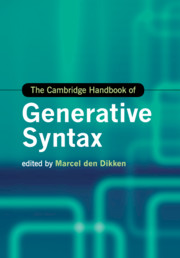Book contents
- The Cambridge Handbook of Generative Syntax
- Series page
- The Cambridge Handbook of Generative Syntax
- Copyright page
- Contents
- Contributors
- Preface
- Part I Background
- Part II Modern generative approaches to the study of sentence structure
- Part III Syntactic structures
- Part IV Syntactic processes: their nature, locality, and motivation
- 14 Economy of derivation and representation
- 15 Syntax, binding, and patterns of anaphora
- 16 Raisingand control
- 17 Agreementand Case
- 18 The localityof syntactic dependencies
- Part V Syntax and the internal interfaces
- Part VI Syntax and the external interfaces
- References
- Index of language names
- Index
14 - Economy of derivation and representation
from Part IV - Syntactic processes: their nature, locality, and motivation
Published online by Cambridge University Press: 05 August 2013
- The Cambridge Handbook of Generative Syntax
- Series page
- The Cambridge Handbook of Generative Syntax
- Copyright page
- Contents
- Contributors
- Preface
- Part I Background
- Part II Modern generative approaches to the study of sentence structure
- Part III Syntactic structures
- Part IV Syntactic processes: their nature, locality, and motivation
- 14 Economy of derivation and representation
- 15 Syntax, binding, and patterns of anaphora
- 16 Raisingand control
- 17 Agreementand Case
- 18 The localityof syntactic dependencies
- Part V Syntax and the internal interfaces
- Part VI Syntax and the external interfaces
- References
- Index of language names
- Index
Summary
Keywords
- Type
- Chapter
- Information
- The Cambridge Handbook of Generative Syntax , pp. 487 - 514Publisher: Cambridge University PressPrint publication year: 2013
- 2
- Cited by

